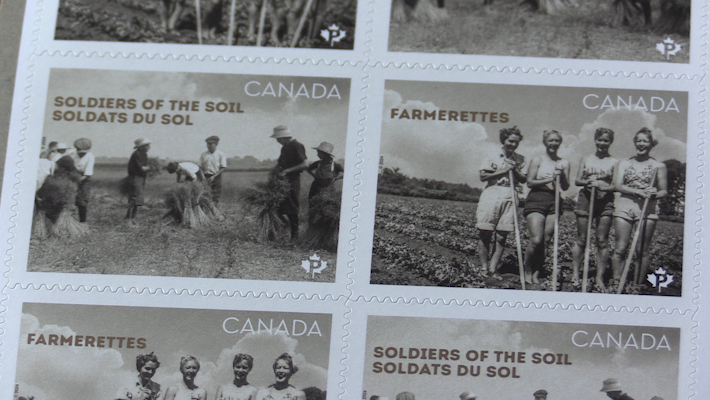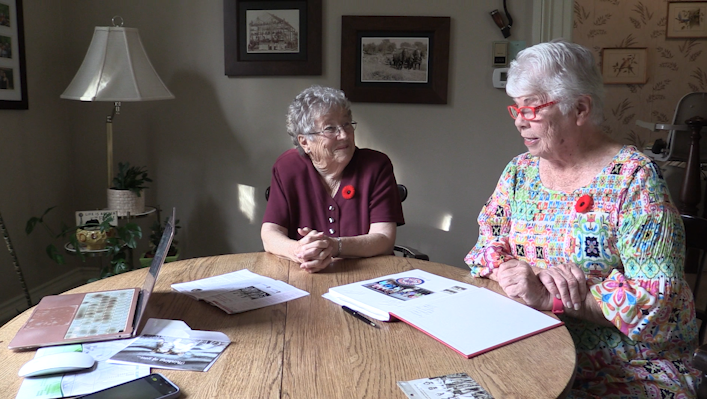Canada Post recognizes 'Farmerettes' for WWII contribution
Isobel Gibson remembers the long, hard days picking vegetables and tending to crops when she was a Farmerette.
“We were just kids. I don't know how patriotic we were, but it was an adventure,” said the Seaforth grandmother.
During and after WWII, 20,000 Ontario girls between the ages of 16 to 18 were shipped off to farms, mainly near Niagara and Windsor, to help keep Ontario’s fruit and vegetable farms operating.
“I think people had forgotten that before you can fire bullets and drop bombs, you have to be fed. And our military and our allies in the United Kingdom and Europe were desperate for food,” said Farmerette researcher and author Bonnie Sitter.
From 1941-1952, Farmerettes kept Ontario farms operational and exporting food to the frontlines. Their story was largely untold, until Sitter, an Exeter native, started her research into the Farmerette’s.
 Farmerette stamps on Oct. 30, 2024. (Scott Miller/CTV News London)
Farmerette stamps on Oct. 30, 2024. (Scott Miller/CTV News London)
Thanks to her work, a book, a play, and now a stamp mark the Farmerette’s war contribution.
“If these girls had not stepped up to, you know, tend the fruits and the vegetables and harvest them, everything would have been rotting, right? And the food would have been lost. They did an important job and people have not stopped to thank them,” said Sitter.
Gibson said all the attention to her short but exciting Farmerette past is both humbling and rewarding.
 Former Farmerette Isobel Gibson speaks with Bonnie Sitter on Oct. 30, 2024, who helped bring the Farmerette’s story back to the public light. (Scott Miller/CTV News London)
Former Farmerette Isobel Gibson speaks with Bonnie Sitter on Oct. 30, 2024, who helped bring the Farmerette’s story back to the public light. (Scott Miller/CTV News London)
“Little did we realize that what we were doing was going to be so impressive years down the road. But yes, it's gratifying to be recognized after all this time,” she said.
A Farmerette’s documentary is yet to come from Sitter, who believes the Farmerette’s deserve as much credit as she can send their way.
“We have interviewed 20 women, mostly between the ages of 93 and 100. So we're capturing their faces and their voices and their memories. They're not going to be forgotten,” she said.
CTVNews.ca Top Stories

Richard Perry, record producer behind 'You're So Vain' and other hits, dies at 82
Richard Perry, a hitmaking record producer with a flair for both standards and contemporary sounds whose many successes included Carly Simon’s 'You’re So Vain,' Rod Stewart’s 'The Great American Songbook' series and a Ringo Starr album featuring all four Beatles, died Tuesday. He was 82.
Hong Kong police issue arrest warrants and bounties for six activists including two Canadians
Hong Kong police on Tuesday announced a fresh round of arrest warrants for six activists based overseas, with bounties set at $1 million Hong Kong dollars for information leading to their arrests.
Read Trudeau's Christmas message
Prime Minister Justin Trudeau issued his Christmas message on Tuesday. Here is his message in full.
Stunning photos show lava erupting from Hawaii's Kilauea volcano
One of the world's most active volcanoes spewed lava into the air for a second straight day on Tuesday.
Indigenous family faced discrimination in North Bay, Ont., when they were kicked off transit bus
Ontario's Human Rights Tribunal has awarded members of an Indigenous family in North Bay $15,000 each after it ruled they were victims of discrimination.
What is flagpoling? A new ban on the practice is starting to take effect
Immigration measures announced as part of Canada's border response to president-elect Donald Trump's 25 per cent tariff threat are starting to be implemented, beginning with a ban on what's known as 'flagpoling.'
Dismiss Trump taunts, expert says after 'churlish' social media posts about Canada
U.S. president-elect Donald Trump and those in his corner continue to send out strong messages about Canada.
Heavy travel day starts with brief grounding of all American Airlines flights
American Airlines briefly grounded flights nationwide Tuesday because of a technical problem just as the Christmas travel season kicked into overdrive and winter weather threatened more potential problems for those planning to fly or drive.
King Charles III is set to focus on healthcare workers in his traditional Christmas message
King Charles III is expected to use his annual Christmas message to highlight health workers, at the end of a year in which both he and the Princess of Wales were diagnosed with cancer.

































